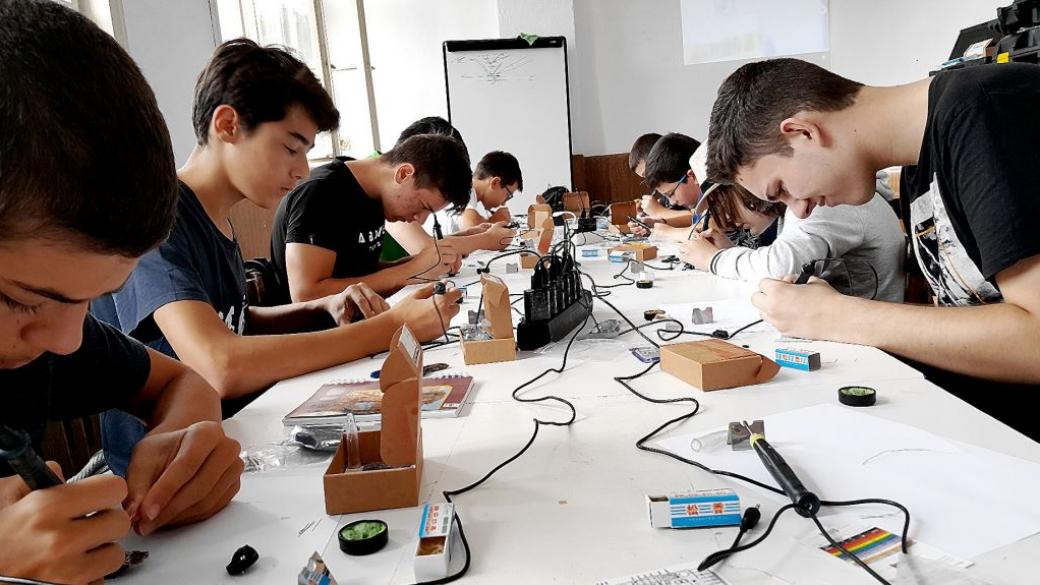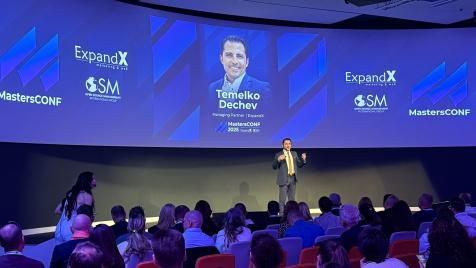Tinusaur, Which Goes Back to the Future
Neven Boyanov’s project teaches programming, robotics and electronics

Tinusaur won a special award in the Innovative Startup category of the Innovative Enterprise of the Year 2018 competition. Neven Boyanov and his colleagues have developed an educational platform and a set of designer kits for programming, robotics and open-source electronics. The training focuses on the engineering aspects of programming. The platform and the kits are used by universities and schools in Bulgaria, Canada, USA, Germany and Mexico.
Neven Boyanov is the founder of the first hackerspace in Veliko Tarnovo, an entrepreneur with several ventures and a lecturer at the University of Veliko Tarnovo. Tinusaur (from “tiny” and “saur”), the project that won the last startup award for him, is like a return to the future. It brings back the fascination of mechanics and engineering at a time when coding is sometimes an end in itself.
Tinusaur is an online platform, a combination of software, hardware, and teaching aids. At a price of around BGN 17, anyone can assemble hardware with boards and kits. Then comes the programming through simple tasks such as connecting LEDs, buttons, etc. to the board to make them glow, blink and make sounds. On this basis, advanced users can develop more sophisticated systems such as home automation, for example. It sounds like a boring job assignment, but it's actually a real challenge for people with imagination and skilled hands.
Tinusaur started in 2013 more like a personal hobby project without a name and a purpose. At that time, I had started to work with microcontrollers. My friends from the Programmers Club in Veliko Tarnovo showed interest in the boards, we organised several workshops, and step by step, it turned into something much more serious. As with most open-source projects, my likeminded fellows gave their free time to work on it,” he explains.
In 2018, the amateur project turned into a business, in order to generate revenue, which ensured the future of the project. Meanwhile, Tinusaur entered Bulgarian and foreign schools and universities, as well as the homes of enthusiasts aged from 5 to 65 in over 50 countries. The project also became part of the software engineering training in the Microcontrollers and Embedded Devices subject of the University of Veliko Tarnovo.
“An important feature of Tinusaur is the cost of the hardware product. The price of the basic kit, i.e. the minimum you need, starts at about USD 5, and the price of the motherboard alone can drop to about USD 2. This makes it ideal for funding by governmental or other initiatives,” Neven adds.
Neven is not a typical programmer, but rather a technician. He has noticed the neglect of engineering in computer science education and looks for a way to bring together hardware and software. At school, and often even in specialised high schools, they are not studied as interrelated subjects, and later on at the university, they are rather theoretical at the cost of the so-called fundamental science. The entrepreneur believes that this is one of the reasons for the shortage of Bulgarian enterprises with their own technological products. “The paradox is that when we graduate and we have to start working, we are required to do just that – to combine our knowledge of all disciplines, to work in a team, etc.”
At the core of the project is training with enhanced interdisciplinary links. Neven emphasises that this approach is not new, but is applied in an innovative way: through tasks with a strong practical focus, with the introduction of problems in the foreground, through teamwork.
Tinusaur helps understand the processes in the opposite direction – from the virtual world of algorithms and mathematics to the real world of physics, chemistry and other sciences. Most young people, when it comes to IT, are mostly focused on pure programming because they have never had the opportunity to get in touch with direct programming of hardware and robotics,” Neven says. According to him, over the past 5-6 years, at least half of the students who went through the workshops, the trainings and the schools on the platform continue to develop in the field of technology.
Tinusaur has quickly turned into a business venture through modern online platforms for raising capital. In 2016, the team collected 57% of the amount they needed through a group funding campaign. Next year, again through group funding, they attracted 180% of the funds needed. In 2018, the opportunity for support by business angels also appeared. “After a presentation before the CEO Angels Club, two potential investors showed interest, we shook hands, registered a company, and since May 2018 Tinusaur is a real business,” Neven explains.
The company made a breakthrough first in North America and Western Europe, and then turned to the Bulgarian market. Its main target group is teachers who can use Tinusaur for training, but not only. At their events, there are 5-6 year old future engineers who want to do something that glows, makes sounds, moves, as well as adults who design products with practical application, or change their profession.
This summer, a team of 6-7-grade students created a scale model of a traffic light based on the knowledge, acquired for less than a week. Neven also has his own Tinusaur project – a home system for watering plant pots that takes into account temperature, soil and air humidity and other pre-set parameters. “When I finish it, it will become part of the curriculum, which will include biology and chemistry,” he smiles.
The training materials for students, university students, and adults are similar but are taught differently. “Everyone can use the project resources freely, modify and share them under the terms and conditions of the open license. Through training, courses and schools, thanks to those who have decided to use our additional services, we will provide financial resources to maintain and develop the platform.”
According to Neven, the place of Tinusaur is in the non-formal education, or at best in extracurricular forms. He says that technology is too dynamic and fast to develop to comply with education systems and programmes. “I want Tinusaur to become a byword for a platform through which children study technology. The kits themselves are cheap and this makes it possible for everyone to afford it. The platform aims to cover the initial stages of getting familiar with science and technology, and then go on with the more complicated one,” he adds, and promises to build a car, which will be able to go back to the future, just like in the movie.

